Trend of capital inflows to keep yuan steady


Analysts optimistic on China's appeal to foreign investors, improved policies
China has seen steady growth of capital inflows in the first half this year, in terms of both foreign direct investment and holdings of onshore financial products, despite global trade tensions and currency turmoil in some emerging markets.
Analysts say the trend may continue in the coming months, which will help support a stable yuan and balance cross-border capital flows. As a wider opening-up of the country's financial sector unfolds, foreign investor confidence in the Chinese economy will be strengthened further, they said.
"Increases of capital inflows are just the beginning of a long-term trend in which China will receive more attention from foreign investors," said Zhu Haibin, chief China economist and head of China equity strategy at J.P. Morgan.
His comment came after the country's foreign exchange regulator, the State Administration of Foreign Exchange, reported on Thursday $3.47 billion in FDI in China's financial institutions in the April-June period.
In the meantime, capital outflow from Chinese financial institutions, including banks, insurers and securities brokers, stood at $2.59 billion, leading to a net $881 million in capital inflows from overseas in the second quarter, up from $798 million in the first quarter, according to the administration.
Total FDI, which also includes investments in nonfinancial sectors, rose 4.1 percent year-on-year to $68.32 billion in the first six months, according to the Ministry of Commerce.
In late June, China unveiled a shortened negative list for foreign investment. A negative list is a list of areas where investment is prohibited; all other areas are presumed to be open.
"Looking at the data for the first half of the year, foreign investors maintained their enthusiasm in the Chinese market," said Huo Jianguo, vice-chairman of the China Society for WTO Studies.
Bai Ming, a researcher at the Chinese Academy of International Trade and Economic Cooperation, attributed the stable FDI growth largely to a series of measures China has taken to open up wider.
Foreign investors also increased financial injections into the Chinese mainland's bond and stock markets during the same period. According to the central bank, by the end of June, foreign investors increased their holdings of renminbi bonds to 1.6 trillion yuan ($232.6 billion), up by 404.1 billion yuan from the end of last year.
June, especially, saw the largest overseas investment in almost two years in China's $12 trillion bond market, the world's third largest. During that time, the country has steadily opened that market to international investors, which may partially balance domestic pressures to take money out.
For the domestic A-share market, foreign investment has increased by a record 100.5 billion yuan during the first half, according to officials.
Steady growth of capital inflows will ease capital outflow pressure and support foreign exchange dynamics and the renminbi, although some foreign investors are still cautious about the escalated trade tensions, said Zhang Yu, an economist at Huachuang Securities.
MSCI Emerging Market Index, one of the world's major stock indexes, decided to include China's A shares last year. It was a catalyst for investments in China by foreign institutional investors, just like their improved access to China's onshore bond market was also a contributing factor, according to Zhu of J.P. Morgan.
The ongoing resurgence in the US dollar across the global currency markets has played a role in triggering currency fluctuations in some emerging markets, including Turkey, Russia and South Africa.
China's foreign exchange reserves, however, unexpectedly increased in July to $3.12 trillion despite the recent weakening of the renminbi, which will help stabilize investor expectations and anchor the renminbi, said Guan Tao, former director of the international payments department of the State Administration of Foreign Exchange.
The country's ongoing structural reform to maintain sustainable and high-quality growth will contribute to a more positive outlook for the renminbi among foreign investors, Guan said. Domestic financial infrastructure, such as the cross-border payment and settlement system, information disclosure platform and the fund trusteeship, have been improving at a fast pace, he added.




































